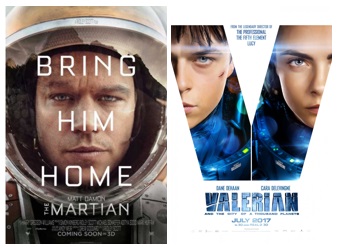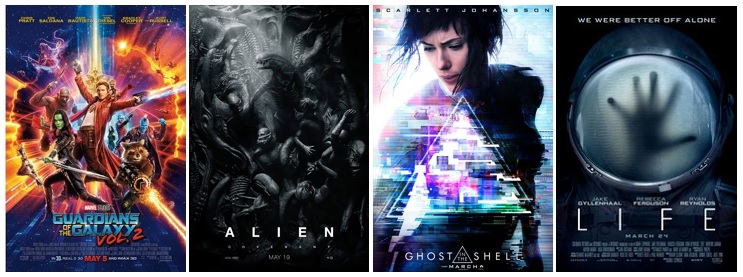Left to right: Guardians of the Galaxy Volume 2, Alien: Covenant, Ghost in the Shell, and Life. Google images.
Science Fiction: An Inside Look into the Future?
June 20, 2017
As the 2016-2017 school year comes to a close, students—free from finals, AP exams, and pop quizzes—are finding more and more time to visit their local theaters to watch the latest blockbuster films to hit the big screens. Especially for 2017, the movie industry has seen an abundance of science fiction and action films already released. Guardians of the Galaxy Volume 2, Alien: Covenant, Ghost in the Shell, and Life are just a few. However, although these movies are works of fiction, they provide a glimpse of possible futures that can take shape decades or hundreds of years from now. And although we don’t often realize it, science fiction has influenced the minds of numerous generations in creating the world as we know it. In fact, the science fiction genre has proved to be an essential medium in furthering technological and scientific advancements, and it has inspired and continues to inspire generations of scientists and researchers in conducting creative and imaginative research.
Today, we are more connected to technology and digital devices than ever before, interacting with newer and faster devices to meet our every needs. Through smartphones and laptops, we have instant information at our fingertips. Through genetic engineering, we consume genetically modified produce that advertises bigger and tastier goods. Through robotic-arm surgery and personalized medicine and therapy, we are able to apply more precise and effective treatments to help ameliorate and even eradicate disease. We might think today that these examples are ordinary and commonplace, but they derive from sources that many people in the distant past believed to be fiction. Ironically, however, science fiction has predicted many technological and scientific advancement that we take for granted in the twenty-first century. For instance, today’s closed-circuit television (CCTV) is reminiscent of the surveillance described in George Orwell’s 1949 dystopian novel 1984. Orwell, who wrote the novel more than sixty years ago, can be said to have predicted modern-day surveillance technology. Another example is the 1960’s television series Star Trek, which envisioned technology that we use every day, including touchscreen devices, voice recognition, and wireless electronics. Also, science fiction gems such as Jurassic Park, Minority Report, and 2001: a Space Odyssey not only brought greater awareness to scientific fields such as genetics, forensic sciences, and aerospace, but predicted fast and efficient DNA sequencing and splicing, motion-sensing computer interfaces, and computer assistance (like Apple’s Siri).

However, science fiction is not only about cool gadgets, modern designs, and larger-than-life spaceships. It is a fountain of moral and ethical messages that acknowledges the consequences of such technology, good and bad. Steven Spielberg’s 1993 film Jurassic Park, based on Michael Crichton’s novel of the same name, is a perfect example of the consequences of new technology. Every kid and kid at heart would stare wide-eyed and mouth agape as a Pteranodon flies swiftly overhead and as herds of Stegosauruses and Brachiosauruses cross their path. However, premature understanding (and excitement) of the effects of resurrecting lost species speaks to both ethical concerns and that of natural selection. Reflecting on Charles Darwin’s theory of the survival of the fittest, one can wonder, “Can species who had their shot return from the dead?” And if so, “Are we the ones to make that happen?” Another example is Stanley Kubrick’s 1968 cinematic masterpiece 2001: a Space Odyssey, which subtly alludes to the pros and cons of higher-thinking computer-assisted technology and artificial intelligence. Science fiction not only emphasizes the excitement of the future, but stresses the importance of being cautious and thinking about the consequences that might result from scientific endeavors.
Although we can see the effects of science fiction on our lives today, what does it have to offer to future generations? Recent movies such as The Martian and Life might be the windows to a future in which humans colonize Mars and astronauts conduct research in zero-gravity conditions. Movies coming soon this year—such as Valerian and the City of a Thousand Planets (based on Pierre Christin’s science fiction comics titled Valérian and Laureline)—might give us a glimpse of intergalactic peace and cooperation if humans do ever encounter extraterrestrial lifeforms in the future.

Science fiction has become more popular and influential through a diverse array of movies, television shows, and literature. And as science fiction classics continue to endure in the hearts and minds of twenty-first-century viewers and readers, this genre will continue to inspire and evoke imagination across all ages. We, members of the human race, must continue this journey of scientific exploration and imagination because if we don’t, who will?
